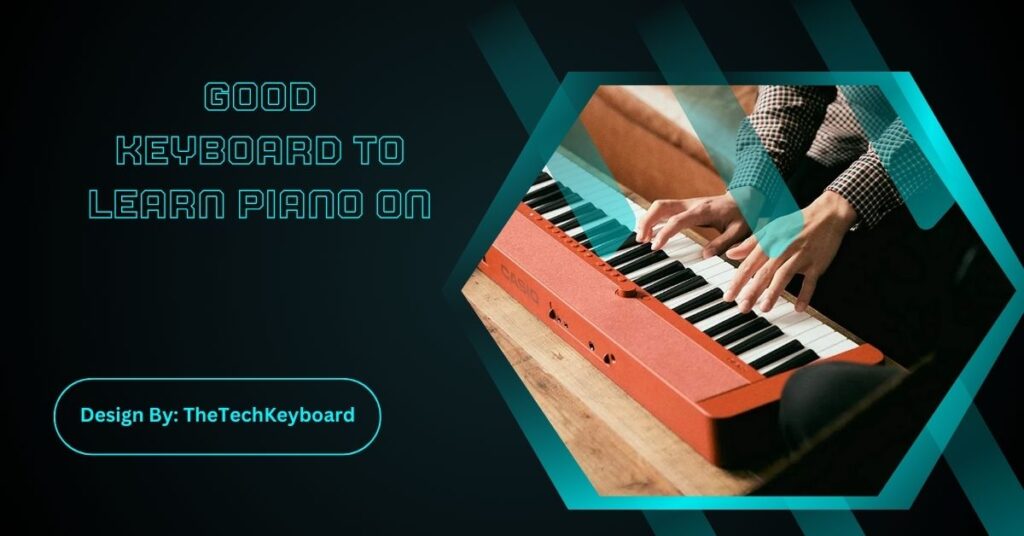A good keyboard to learn piano has at least 61 full size touch sensitive keys, quality sound, and portability. Weighted keys are ideal for realism, while affordable beginner models are perfect for starting lessons.
Learning to play the piano is exciting, but choosing the right keyboard for beginners can make all the difference. With so many options available, it’s easy to feel confused about which one to buy. A good keyboard to learn piano on should be comfortable to play, have enough keys for practice, and offer realistic sound.
In this guide, we’ll explore what makes the best keyboard for beginner piano players, the features you should look for, and some tips for picking the perfect beginner friendly instrument.
Why Choosing the Right Keyboard Matters?
The keyboard you start with will shape your learning experience. If your instrument feels too small, has poor sound quality, or lacks touch sensitive keys, you may get frustrated and lose motivation.
A beginner friendly electronic keyboard helps you:
- Develop proper finger strength and technique
- Enjoy better sound, closer to an acoustic piano
- Stay motivated with easy to use learning features
What is the Best Keyboard to Learn Piano On?

The best starter keyboard piano for beginners will depend on your goals, budget, and space. For example, if you plan to transition to a real piano later, you might want a weighted key keyboard for learning piano. If you’re learning for fun, a simpler, affordable piano keyboard for beginners could be enough.
Generally, look for these features:
- Touch sensitivity Keys that respond to how hard or soft you press
- Weighted or semi weighted keys Closer to the feel of an acoustic piano
- Full size keys Helps develop correct finger placement
- At least 61 keys Enough range for most beginner songs
- Good built in sounds Makes practice more enjoyable
Is a 61 Key Keyboard Enough to Learn Piano?
Many beginners ask: Is a 61 key keyboard enough to learn piano? The answer is yes, at least for your first stage of learning. A 61 key entry level keyboard piano covers most beginner music pieces and basic techniques.
However, if you aim to play advanced classical music later, consider moving to a full size 88 key digital piano when your skills improve.
Should Beginners Buy Weighted Keys for Learning Piano?
If you want the closest experience to a real piano, weighted key keyboards for learning piano are the way to go. They mimic the resistance you feel on an acoustic piano, which strengthens your fingers and improves control.
For those on a tighter budget, semi weighted keyboard keys or touch sensitive keyboards for beginners can still give a good feel without the high cost.
How to Choose a Keyboard for Piano Beginners?
When thinking about how to choose a keyboard for piano beginners, consider these factors:
- Number of keys At least 61, preferably 76 or 88 for long term use.
- Touch sensitivity So dynamics (loud/soft) respond to your playing.
- Portability A portable keyboard piano for students is easier to move and store.
- Budget Find a balance between affordability and features.
- Learning tools Look for built in metronomes, lesson modes, and app compatibility.
Best Piano Keyboard for Home Practice
If you’re not planning to travel with your keyboard, you might want a digital piano for beginners with a sturdy stand and pedals. These feel more like real pianos and often have better sound quality.
For best keyboard for piano practice at home, choose one with:
- 88 full size weighted keys
- High quality speakers
- Sustain pedal support
- Built in recording functions
Recommended Beginner Keyboards for Piano Lessons
Here are some recommended beginner keyboards for piano lessons that balance price, quality, and features:
- Yamaha P 45 Affordable and comes with weighted keys.
- Casio CDP S110 Slim design, good sound, full size keys.
- Alesis Recital Semi weighted keys, great for beginners on a budget.
- Roland FP 10 Excellent sound and touch for serious learners.
These models are great music keyboards for self learning piano or guided lessons.
Difference Between Digital Piano and Keyboard for Learning
When looking at the difference between digital piano and keyboard for learning, here’s the main point:
- Digital piano: Designed to closely mimic an acoustic piano, usually with weighted keys and better sound.
- Electronic keyboard: More portable, often has more sound options, but may lack weighted keys.
If realism is your priority, choose a full size 88 key digital piano. If portability and variety are important, a beginner friendly electronic keyboard is fine.
Piano Learning Tips for Beginners

No matter which keyboard you choose, these piano learning tips for beginners will help you progress:
- Practice daily, even for just 15–20 minutes.
- Focus on proper hand posture.
- Use a metronome for rhythm.
- Learn music theory basics.
- Play songs you enjoy to stay motivated.
Acoustic Piano vs Digital Piano for Beginners
For most beginners, an electric piano for home use is more practical than an acoustic piano. Digital models are lighter, cheaper, and don’t need tuning. However, if you love the authentic sound and feel, an acoustic piano is unbeatable—just less convenient.
Piano Keyboard Buying Guide for Beginners
Here’s a quick piano keyboard buying guide for beginners:
- Budget under $200 Look for 61–76 key touch sensitive keyboards.
- Budget $200–500 Go for semi weighted 88 keys for more realism.
- Budget over $500 Choose a fully weighted digital piano with advanced features.
FAQs:
1. Can I start learning piano on a 61 key keyboard?
Yes. A 61 key keyboard is enough for most beginner songs and lessons. However, if you plan to play advanced classical pieces, upgrading to a full size 88 key digital piano is recommended later.
2. Are weighted keys necessary for beginners?
Weighted keys are not required but highly recommended. They mimic the feel of an acoustic piano, building proper finger strength and technique. Beginners on a budget can start with touch sensitive or semi weighted keys.
3. What features make a keyboard good for piano practice?
Look for touch sensitivity, full size keys, realistic sound, and at least 61 keys. Weighted or semi weighted action, sustained pedal support, and built in learning tools make practice more effective and enjoyable.
4. How much should I spend on my first beginner keyboard?
Beginner keyboards range from $150 to $500. Under $200, you can find 61–76 key touch sensitive models. Higher budgets allow for 88 key weighted keyboards with better sound quality and durability for long term learning.
5. What’s the difference between a digital piano and an electronic keyboard?
A digital piano aims to replicate an acoustic piano’s feel and sound, often with weighted keys. An electronic keyboard is lighter, more portable, and offers varied sounds but may lack realistic piano touch.
Conclusion
Choosing the right keyboard to learn piano can set you up for success. Beginners should look for at least 61 full size, touch sensitive keys, with weighted keys offering the most realistic feel. Portable, affordable models work well for casual learning, while digital pianos suit more serious students. Sound quality, durability, and comfort should guide your choice. Whether you pick a beginner friendly electronic keyboard or a full size digital piano, the right instrument will make learning enjoyable and help you progress quickly toward your musical goals.


